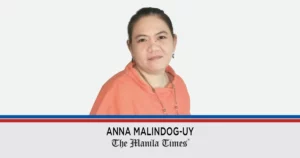THE release of a purported transcript of an alleged “new model agreement” between the Philippines and China has ignited significant controversy, prompting President Marcos to initiate an investigation into claims that China wiretapped a phone conversation between Vice Admiral Alberto Carlos, former chief of the Western Command of the Armed Forces of the Philippines (AFP) and a Chinese diplomat. A Senate hearing is also being conducted in this regard, to which the Chinese envoy to the Philippines has been invited.
The transcript was of an audio recording purportedly documenting a phone conversation on Jan. 3, 2024, which implies that Vice Admiral Carlos had acquiesced to the so-called new model for managing resupply missions to the disputed Second Thomas Shoal, where the BRP Sierra Madre is marooned. In the transcript, Carlos indicated to the Chinese diplomat that the proposed “new model” had received approval from higher authorities, including a name redacted in the document, AFP Chief General Brawner, Defense Secretary Gibo Teodoro and National Security Adviser Secretary/General Año.
In this context, it is crucial to consider the implications of the Marcos administration’s actions, including the investigation into China’s alleged wiretapping of an AFP official, as ordered by the President. It is also imperative to ask whether this investigation is futile, given the potential lack of direct actionable outcomes. Additionally, we need to evaluate the implications of inviting the Chinese envoy to the Senate hearing on this issue.
Schrödinger’s cat paradox
From my vantage point, this alleged “new model,” or “one-plus-one,” agreement between the Philippines and China embodies Schrödinger’s cat paradox. This model is like a sealed box: until it is implemented and its outcomes are observed, it can lead to several states of geopolitical reality. It could mean easing tensions through cooperation and diplomacy or increasing conflict and tension.
This means that different potential outcomes or interpretations of the so-called new model agreement remain uncertain or “in superposition” until some action or event (described metaphorically as “opening the box”) clarifies or decides the actual outcome. The very nature of this uncertainty is akin to a puzzle waiting to be solved. Note that this uncertainty is exacerbated by the geopolitical complexities of the contested waters of the SCS, including the involvement of other regional actors, such as the United States and other Southeast Asian nations.
Hence, just as in Schrödinger’s cat experiment, where the cat’s fate is entangled with the quantum state of the radioactive atom, the fate of the Second Thomas Shoal and the broader SCS dispute is entangled with the geopolitical interests, strategic calculations and diplomatic maneuvers of the involved parties.
Futility
On the other hand, Marcos’ decision to order an investigation into allegations of China’s wiretapping of an AFP official carries several significant implications. First and foremost, this move may further strain the already challenged diplomatic relations between the Philippines and China. From a realistic point of view, depending on the severity of the diplomatic fallout, there could be significant economic repercussions.
Given the substantial trade and investment ties between the two countries, significant tensions could have far-reaching adverse economic impacts. Hence, if the potential fallout outweighs the benefits of pursuing the investigation, this could be counterproductive, putting the Philippines in a disadvantageous position. Moreover, transparency is crucial in this investigation. A perceived lack of transparency could lead to public dissatisfaction, while a well-handled and good-faith investigation might reinforce trust in governmental competence.
Moreover, the question of whether the investigation into China’s alleged wiretapping of AFP officials is futile or not can be viewed from multiple perspectives. First, proof and attribution are difficult, suggesting the investigation might be futile. Second, the Philippines has limited response options. For instance, even if the investigation confirms the allegations, the Philippines’ response options might be limited to diplomatic protests, given China’s global economic and political influence and military strength. This could make the investigation seem symbolic but unpragmatic rather than a precursor to pragmatic and effective action.
Thus, the utility of the investigation into China’s alleged wiretapping should be weighed against its direct outcomes and broader implications for national security, diplomatic relations and public confidence. In addition, it’s important to consider the potential impact on future diplomatic relations with China, as the investigation could strain the already tension-driven and very much challenged bilateral relations between the two countries, and the impacts on other areas of bilateral cooperation and relations.
Furthermore, inviting the Chinese envoy to the Senate hearing on the alleged wiretapping incident touches on diplomatic sensitivities. This move could increase the risk of escalation of tension between the two sides, leading to more damaged diplomatic relations between the Philippines and China. Indeed, inviting the Chinese envoy to the Senate hearing is a bold and multifaceted move with far-reaching implications. It underscores the complexities of international relations, the importance of transparency and accountability, and the delicate balance required in handling sensitive diplomatic issues.
Is this the right tack?
Indeed, this investigation is delicate and presents a complex challenge for the Marcos administration. It requires a careful balance, especially in preserving a functional and constructive relationship with China, a powerful neighbor and key economic partner that has emerged as the regional superpower.
In retrospect, determining whether ordering an investigation into China’s alleged wiretapping is appropriate, and the right tack hinges on the Philippine government’s broader objectives. Nevertheless, this investigation must be approached with a balance of caution and optimism, weighing diplomatic considerations and the potential economic and political fallout, and its repercussions. The objective I suppose is to open avenues for constructive dialogue and mutual understanding between the Philippines and China. Ultimately, the decision to pursue such investigations should be guided by a comprehensive evaluation of risks and benefits, taking into account the immediate and long-term implications for the nation’s economic welfare, security, diplomacy, regional and international standing, and internal political stability.
Source: The Manila Times
https://www.manilatimes.net/2024/05/25/opinion/columns/exploring-the-impact-of-inquiry-into-chinas-alleged-wiretapping-of-a-ph-military-official/1948223


